Federal team to help with COVID-19 surge at Dothan hospital
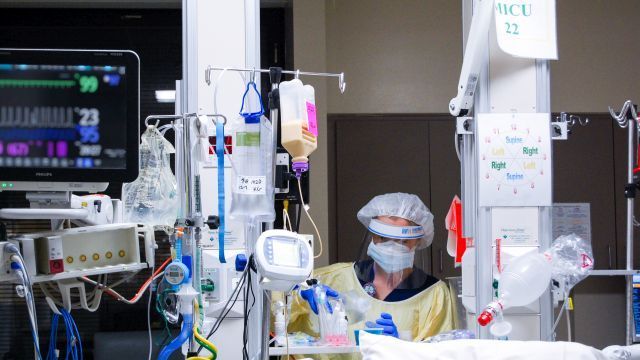
A federal team of health care workers is being sent to a southwest Alabama hospital seeing a surge in COVID-19 patients, the state health officer said Wednesday. State Health Officer Scott Harris said the U.S. Department of Health and Human Services is sending a task force team to Southeast Medical Center in Dothan. Sitting in the far southeast corner of the state, the hospital sees patients from Florida and Georgia. The hospital this month set a new pandemic high with 119 COVID-19 patients. Alabama is seeing a surge in COVID-19 cases that medical officials say is being fueled by low vaccination rates and the highly contagious delta variant. South Alabama hospitals have been particularly hard hit. The first team in the state was sent to South Baldwin Regional Medical Center in Foley. Similar teams have been sent to help in Louisiana and Mississippi. Between July 19 and Aug. 25, Alabama went from having 500 COVID-19 patients in state hospitals to 2,845. By comparison, the state had 3,087 patients in the hospital at the January peak of the pandemic. The state has more patients receiving intensive care across the state than there are designated intensive care beds in the state, according to the Alabama Hospital Association. While some hospitals have available ICU beds, other areas are over capacity and have converted other space to intensive care. Republished with the permission of the Associated Press.
Alabama ranks 4th in country for new virus cases
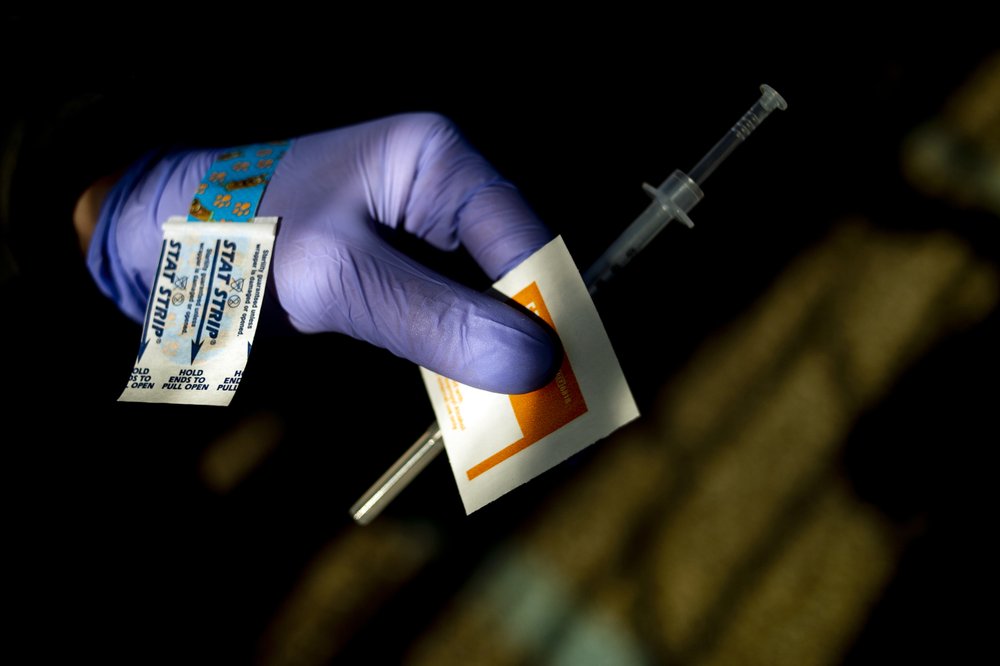
Alabama now ranks fourth in the country for the most new COVID-19 cases per capita, as medical officials hoped full federal approval of the Pfizer vaccine will persuade people to get vaccinated. According to numbers compiled by Johns Hopkins University, Alabama ranked behind Louisiana, Mississippi, and Florida for the most new cases per capita in the past 14 days. “The Gulf states are pretty much continuing to be on fire,” Dr. Jeanne Marrazzo, director of the Division of Infectious Diseases at the University of Alabama at Birmingham. The FDA gave full approval to Pfizer’s COVID-19 vaccine Monday, potentially boosting public confidence in the shots. Alabama has one of the lowest vaccinations rates in the country, ranking slightly below Mississippi in the percentage of people fully vaccinated. Dr. Paul Goepfert, director of the Alabama vaccine research clinic, said it will be hard to predict the impact of the approval but added it might improve the vaccination rates by a few percentage points. “People can no longer say with a straight face that they won’t take it because of lack of FDA approval,” Goepfert said. State health officials on Monday urged people to get vaccinated. “We have high levels of disease transmission in every county throughout the state. COVID-19 vaccination will help keep our communities safe and our children in school,” State Health Officer Scott Harris said in a statement Monday. The seven-day rolling average of daily new cases in Alabama has risen over the past two weeks from 2,829.14 new cases per day on Aug. 7 to 4,024.00 new cases per day on Aug. 21. The Alabama Hospital Association on Monday said that 84% of adults hospitalized for COVID-19 in the state are unvaccinated. Intensive care units, particularly in some areas of the state, are being stressed by the wave of mostly unvaccinated patients. A little more than half of all intensive care unit beds in the state are filled with someone with COVID-19. Hospital officials at Springhill Medical Center in Mobile last week told WKRG that out of 102 hospitalized patients, seven were vaccinated. “Between breaths, they beg me for the vaccine. They beg me to save them. I just have to look at them and say, ‘It’s too late right now. We can’t right now, but you keep fighting,’” nurse manager Abby Wilson told the station.
Kay Ivey urges Alabama football fans to get vaccinated
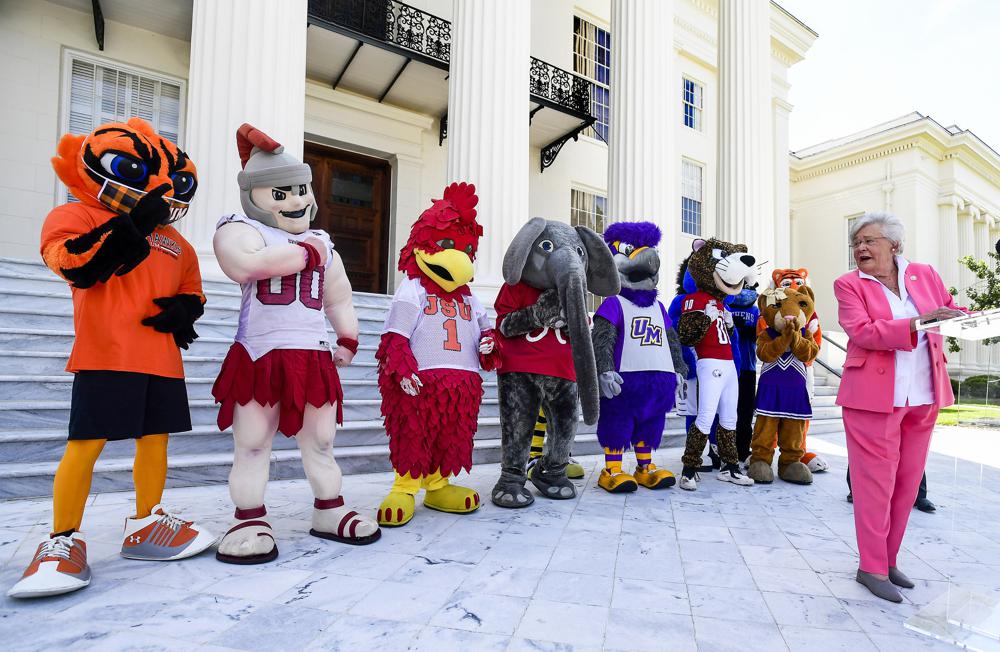
Alabama Gov. Kay Ivey is urging college football fans to get vaccinated before heading to stadiums this season. College football kicks off in a few weeks, raising concerns that crowded stadiums could help spread the coronavirus. Asked about those concerns this week, the Republican governor said the remedy is for more people to get vaccinated. “If everybody would just get the vaccine, we wouldn’t have a problem. Simply get the shot, then go enjoy your football game,” Ivey told reporters after participating in an event with college mascots on the steps of the Alabama Capitol. Dr. Scott Harris, Alabama’s state health officer, said the state Department of Public has issued guidance on sporting events, including recommending spacing and emphasizing the importance of vaccinations. “Outdoor events are safer in general than indoor events, but having hundreds of thousands of people getting together during a pandemic is going to result in some disease transmission,” Harris said. “We hope people are vaccinated enough that that can be minimized.” Alabama has one of the lowest vaccination rates in the U.S., with 34.6% of the population fully vaccinated. The state has seen a recent surge in COVID-19 cases, hospitalizations, and deaths that medical officials have attributed to the highly contagious delta variant and the state’s low vaccination rate. Alabama coach Nick Saban has also been an outspoken advocate for getting vaccinated and participated in a public service announcement over the summer encouraging Alabamians to please “get your COVID-19 vaccine.” Saban, earlier this month, again urged people to get vaccinated. “We’re hopeful that we’ll be able to have full capacity in the stadium,” he said. “I’m hopeful that more and more people will get vaccinated so they’ll have the opportunity to do that. But that’s everybody’s personal choice.” Republished with the permission of the Associated Press.
Tidal wave of virus cases hits Alabama hospitals
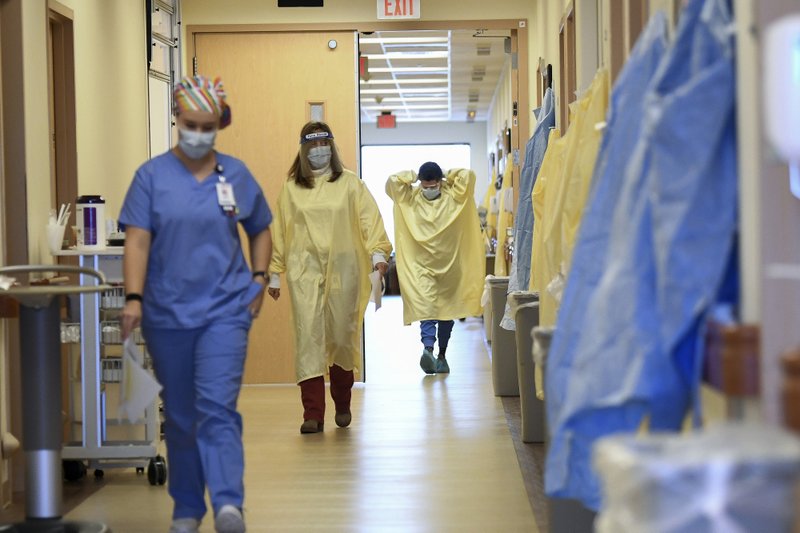
A “tidal wave” of COVID-19 cases is putting severe stress on Alabama hospitals, medical officials said Thursday, adding the state will likely soon surpass the previous record for hospitalizations. “We need Alabamians to understand we are in a difficult position right now. We are seeing case numbers again as high as we have ever seen,” State Health Officer Scott Harris said in a weekly briefing with reporters. “That has put a severe stress on our hospital situation. We have only 5% of our ICU beds available statewide. many facilities, particularly in the southern part of the state, do not have available ICU beds at this time.” Medical officials have said a surge in cases is being driven by low vaccination rates and the highly contagious delta variant and implored people to get vaccinated and wear masks to combat the spread and prevent severe illness. Dr. Sarah Nafziger, vice president of the University of Alabama at Birmingham Hospital Clinical Services, said the hospital has had to limit the number of procedures they are doing and decline transfers to the hospital. “We are seeing an absolute tidal wave,” Nafziger said. She said the hospital is providing care and emergency services, but she said the trends and projections are alarming. “I hate to even talk about these things happening, but that’s what happening. That’s the reality of what’s happening. When you think about running out of hospital beds and running out of health care resources, that is the path that we are on.” There were 2,441 COVID-19 patients in state hospitals on Thursday, according to numbers provided by the Alabama Department of Public Health. If the trajectory continues, Harris said the state will surpass the previous high of 3,087 within a few days. The overwhelming majority of patients hospitalized for COVID-19 are unvaccinated, Harris said. Numbers provided by state hospitals indicate that 89% of COVID-19 patients in state hospitals have not been fully vaccinated. Harris said 11% of hospitalized virus patients have been fully vaccinated, and 3% have been fully vaccinated, according to numbers provided to the state by hospitals. At UAB, Nafziger said 91% of hospitalized patients are unvaccinated. Alabama ranks fifth in the country for new cases per capita, behind Florida, Louisiana, Arkansas, and Mississippi, according to researchers at Johns Hopkins University. Alabama is seeing an average of 3,400 new cases per day. Republished with the permission of the Associated Press.
Kay Ivey interviews Scott Harris to help answer COVID-19 vaccine questions and concerns
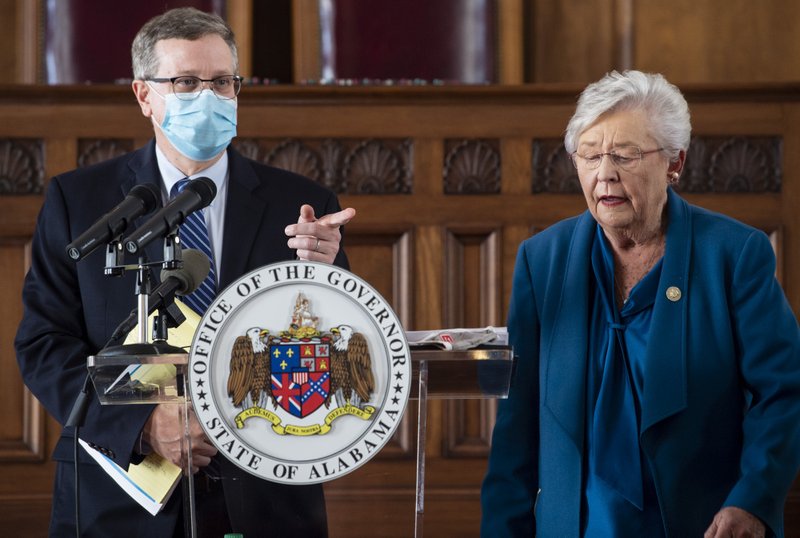
Gov. Kay Ivey posted a video on Twitter, interviewing state Health Officer Dr. Scott Harris to ask questions related to COVID-19 vaccine hesitancy. Only 34% of Alabama’s population is fully vaccinated, which is the lowest in the nation reported the Associated Press. There has been an increase in the vaccination rate recently, but it’s unknown if it will help stem the flood of new cases since it takes weeks for a newly vaccinated person to be fully protected. Kay Ivey stated on Twitter, “In honor of #ImmunizationAwarenessMonth, I sat down with State Health Officer Dr. Scott Harris to ask some #COVID19 questions related to vaccine hesitancy.” Ivey has come under fire for not promoting shot incentives more heavily. Despite Ivey’s refusal to offer incentives to the public, the state prison system is offering $5 in commissary credits for inmates who get vaccinated. The University of Alabama is giving $20 credit on a student debit card to any student who proves they are vaccinated by Aug. 28. Additionally, the Montgomery-area government, public schools, and the state health department are providing free state fair tickets to people who get fully vaccinated in the capital. In an opinion piece published Tuesday by The Washington Post, Ivey defended her approach. “There are those who believe that government should mandate the vaccine or that we should bribe people to take it. That’s not going to happen in my state, no matter how many times the media ask me,” Ivey wrote. The Alabama Department of Health is also sponsoring a TikTok contest to encourage younger people to get vaccinated.
Health officials recommend all Alabama students wear masks

Alabama public health officials are recommending that all students and teachers wear masks in the classroom because of a surge in COVID-19 cases, a spokesperson said Wednesday. The Alabama Department of Public Health will recommend universal masking in schools due to the high levels of COVID-19 in the state, department spokesperson Ryan Easterling said. The recommendation will be included in the “school toolkit,” suggesting guidelines to mitigate pandemic risk. “Schools can choose to follow guidelines or not. However, these guidelines represent the best evidence available to protect students, teachers, and staff by reducing the transmission of COVID-19, along with disease, potential hospitalization, and risk of death from this virus,” Easterling wrote in an email. The U.S. Centers for Disease Control and Prevention on Tuesday recommended indoor masks for all teachers, staff, students, and visitors at schools nationwide, regardless of vaccination status. The recommendation comes amid a sharp uptick in COVID-19 fueled by the highly contagious delta variant of the virus. Some Alabama school systems have announced they will require students and teachers to wear face masks indoors following new federal guidelines to curb the spread of COVID-19. The Birmingham, Huntsville, Bessemer, and Opelika school systems are among those that have said that masks will be required indoors. A spokesperson for the Alabama Department of Education said Tuesday that mask mandates will be a local decision unless they get specific new guidance from state officials. “Due to the upward trend of COVID transmission and the current local positivity rate, this decision is in the best interest of our students and staff at this time,” Opelika City Schools Superintendent Mark Neighbors said in a statement. However, state education officials so far are not requiring face coverings. “For the coming school year, face masks are not mandated in Alabama schools. That will remain the case unless there is specific guidance from the Alabama Department of Public Health (ADPH) to suggest otherwise,” spokesperson Michael Sibley said Tuesday. “However, local superintendents and school boards can determine for themselves if they want to enforce masking. That would be a local decision.” State Health Officer Scott Harris said earlier this week that the state was waiting for the new CDC guidance before issuing their recommendations to school systems. “The issue of masks in schools is like everything else — highly controversial. They really shouldn’t be,” Harris said. A spokesperson for Alabama Gov. Kay Ivey last week told reporters that she was opposed to requiring masks in schools. Her office has not commented on the new CDC guidelines, but in an opinion piece published Tuesday by The Washington Post, Ivey promoted vaccinations over masks and distance learning. “Here is the truth: Closing businesses will not defeat covid-19. Wearing masks will not defeat covid-19. And keeping our students from in-classroom learning will not defeat covid-19,” Ivey wrote. Alabama has seen a sharp increase in the number of COVID-19 cases. The number of people in state hospitals has risen to more than 1,000, the most the state has seen since winter when there were 3,000 people hospitalized at the pandemic’s peak. Republished with the permission of the Associated Press.
Shot incentives offered in Alabama despite state refusal
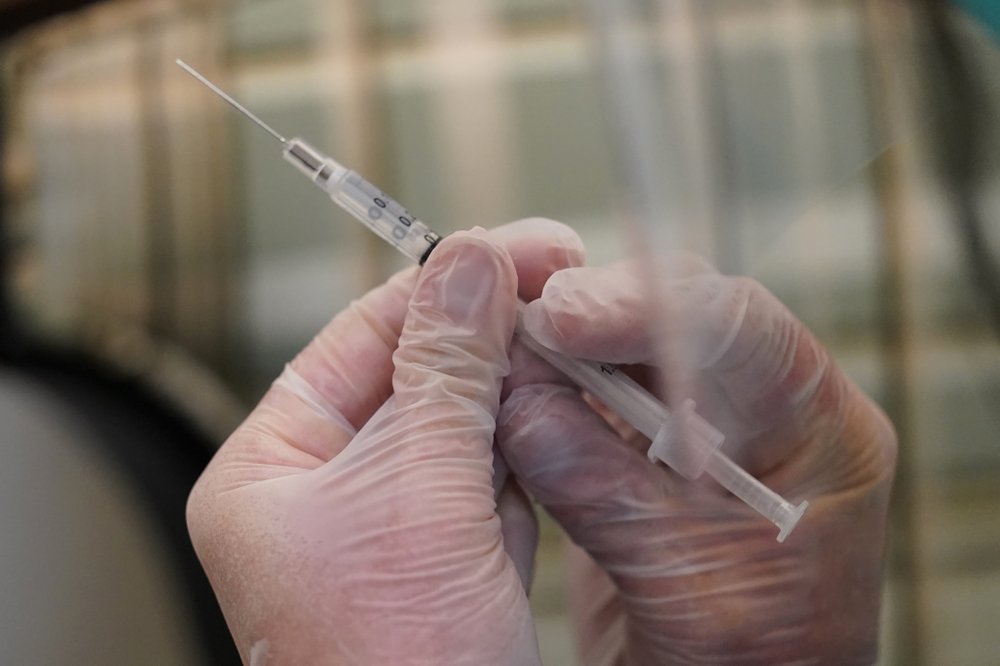
A north Alabama city, state universities, and others are offering cash and other perks for people to get vaccinated for COVID-19 despite the state’s resistance to incentives aimed at improving the state’s worst-in-the-nation inoculation program. In Gadsden, which last week began offering $100 cash to residents who get fully vaccinated between July 19 and Oct. 15, 94 people received shots in six days, said Deborah Gaither, director of the Gadsden Etowah County Emergency Management Agency. “That’s a really good number,” Gaither said Tuesday, adding: “Some of our pharmacies stated they haven’t given a vaccine in weeks.” While some complained about getting vaccinated earlier and not being eligible for the money, Gaither said the city of 35,000 had to do something to boost immunizations since cases of COVID-19 are rising rapidly. “We’re at the point now that we’ve got to do whatever it takes to get people vaccinated,” she said. Nearly everyone who is hospitalized or dying now is unvaccinated, officials have said. Auburn University, with an enrollment of more than 30,000 students, announced incentives including improved parking, free meals, $1,000 scholarships, priority class registration, and lunch for four with the president to students who are fully vaccinated for the fall semester. As part of the program, students have to agree to let the school publicize their prize. The University of Alabama said it will provide a $20 credit on a student debit card to any student who proves they are vaccinated by Aug. 28, and Montgomery-area government, public schools, and the state health department are providing free state fair tickets to people who get fully vaccinated in the capital. Dr. Scott Harris, head of the Alabama Department of Public Health, said he supports local initiatives to boost vaccinations, but that other states have had minimal success with larger incentive programs. “I would say we’re certainly not opposed to incentives at all. However, I don’t know of an incentive program that has been wildly successful anywhere,” he told a news conference. The state prison system also is offering $5 in commissary credits for inmates who get vaccinated even though Gov. Kay Ivey has refused to consider such incentives for the general public. Instead, she has said, “common sense” should be enough for people to get the shots. Just 34.1% of Alabama’s population is fully vaccinated, the lowest nationally. Hospitalizations for COVID-19 have risen to 1,083, the highest since mid-February, amid the worsening spread of a new variant, and more than 11,490 have died of the illness caused by the coronavirus. In an opinion piece published Tuesday by The Washington Post, Ivey defended her approach. “There are those who believe that government should mandate the vaccine or that we should bribe people to take it. That’s not going to happen in my state, no matter how many times the media ask me,” wrote Ivey, who was vaccinated in public months ago. Ivey, who previously said it was “time to start blaming the unvaccinated folks” for the worsening rise in cases, wrote that “those who are pushing fake news and conspiracy theories about this vaccine are reckless and causing great harm to people.” “The unvaccinated folks are being lied to, and that is just plum sad,” Ivey said in the piece. Over the past two weeks, the rolling average number of daily new cases has increased by 1,033, a jump of 185%, according to researchers at Johns Hopkins University. There were 345 new cases per 100,000 people in Alabama over the past two weeks, which ranks seventh in the country for new cases. While relatively few people are now wearing face masks in public in the state despite its low vaccination rate, Harris told a news conference that people without vaccinations should continue covering their mouth and nose in public. Harris said he does not expect the state to issue another order requiring masks. Cases of COVID-19 and hospitalizations are still far below the levels from December and January, but Harris said the growth in cases right now is “unprecedented.” Republished with the permission of the Associated Press.
‘A wildfire:’ Virus hospitalizations near 1,000 in Alabama
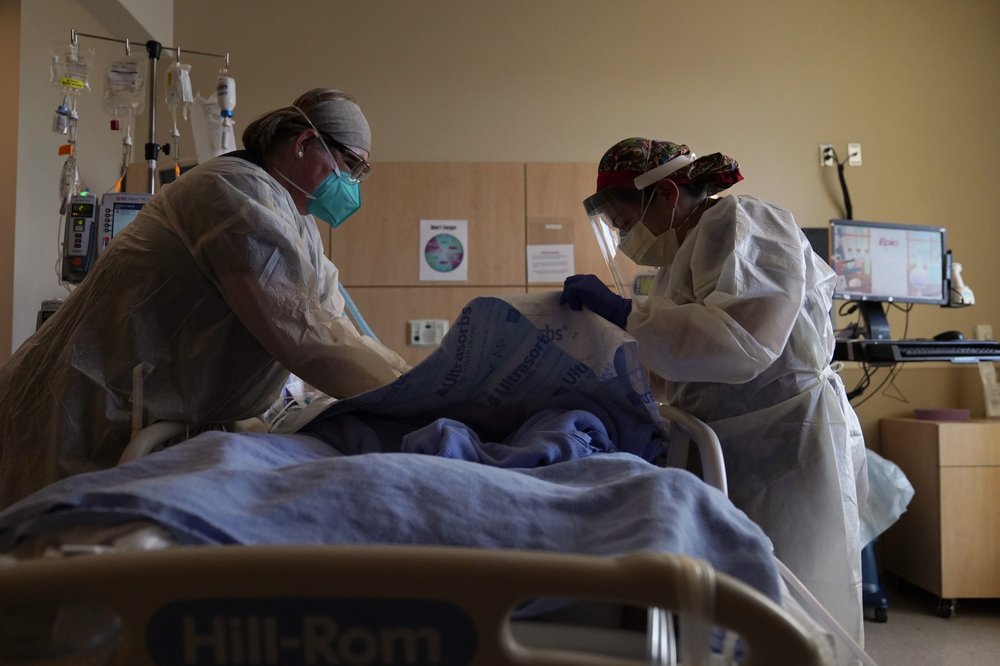
The number of COVID-19 patients in Alabama hospitals Monday climbed to more than 900 — a number the state has not seen since February — as the state sees a surge in virus cases. There were 947 COVID-19 patients in state hospitals Monday, up from 204 at the beginning of July, according to numbers from the Alabama Hospital Association. The latest number is about a third of where the state was at the peak of the pandemic when there were 3,000 virus patients in state hospitals in January. Dr. Scott Harris, who serves as Alabama’s state health officer, said he is “extremely concerned” about the rise in cases. “It’s the perfect storm of large numbers of unvaccinated people and the delta variant which is highly infectious and much more transmissible than anything we saw before,” Harris said. Dr. Don Williamson, the former state health officer who now heads the Alabama Hospital Association, said the concern is not the number itself, but the steep upward trajectory in numbers. Williamson said the state has the solution in the form of the vaccine, but “there is not a long line of people wanting to be vaccinated.” Health officials say the latest spike is associated with the delta variant which is exploiting low immunization rates, summer crowds, and the end of cautionary measures like mask-wearing. “It has hit, and it’s hit with a vengeance. We are now dealing with a wildfire and this wildfire is burning out of control,” Dr. Mike Saag, a professor with the University of Alabama at Birmingham’s Division of Infectious Diseases, said Monday. “By the time we get to October, if we haven’t changed our — for lack of a better word — behavior about getting vaccinated and wearing masks in public, I think we could be in a very bad situation,” Saag said. Like the surge in the number of virus patients in hospitals, other barometers of the pandemic are seeing a similar rise. The percent of COVID-19 tests coming back positive has jumped to 11.7% after lingering below 5% for many months. The seven-day rolling average of daily new cases in Alabama has tripled over the last two weeks, rising from 472 new cases a day on July 10 to 1,495 on Saturday, according to researchers at Johns Hopkins. Dr. Jeanne Marrazzo, director of the Division of Infectious Diseases at UAB, said the number of COVID-19 patients in hospitals jumped by several hundred over just one week. “It’s just going to be a matter of time I think before we start seeing a devastating toll in terms of deaths,” Marrazzo said. While Alabama’s mask mandate has expired, both Marrazzo and Saag urged a return to voluntarily mask-wearing, in public and in schools. “I think we should all go back to mask-wearing, especially when we’re out in public. We should avoid large crowds. We don’t have to lockdown. We don’t have to be at home. But if you do go out, make sure you’re wearing a mask, even if you’re vaccinated.” Harris said he previously had optimism the state would not see winter-level case numbers again. Now, he is unsure. Alabama ranks last in the nation for the percentage of people who are fully vaccinated, according to numbers from Johns Hopkins. “We have really stalled out on vaccinations. We have encountered people that just have a very firm determination to never be vaccinated,” Harris said. “It’s frustrating for all of us in public health. We hate to see all of the work we’ve done for a year-and-a-half to suddenly go up in smoke just because we can’t get people vaccinated.” Republished with the permission of the Associated Press.
Health officer: Face mask requirement may be needed indoors

Cases of COVID-19 are rising exponentially in Alabama’s largest metro area because a new, highly contagious variant is spreading among the unvaccinated, and public places should consider a return to requiring face masks, the head of the area health department said Thursday. Dr. Mark Wilson, the health officer for Jefferson County, said studies have shown that the delta variant that’s taken hold in Alabama can spread between people in less than a minute, so any indoor area where people gather might need a face mask requirement or at least a strong recommendation that people wear them. The seven-day rolling average for new cases of COVID-19 has risen eightfold from 13 to 107 a day, he said, and additional new cases and more deaths linked to the pandemic are inevitable, she said. “The tragic thing is that almost all of these deaths will have been prevented if only those people had been vaccinated,” Wilson said. The problem isn’t isolated to Jefferson County: Only eight of Alabama’s 67 counties aren’t considered at high risk for the illness caused by the coronavirus, and roughly 50 more patients a day are being admitted to state hospitals with COVID-19, which already has killed more than 11,460 people in Alabama. With only 31% of the population fully vaccinated and nearly all the new, most serious cases among people who aren’t inoculated, Wilson said the state’s vaccination rate is “way, way below” what is needed to control the pandemic. Gov. Kay Ivey told reporters Thursday the blame for the new surge in cases is with people who refuse to get vaccinated. “The few cases of COVID are because of unvaccinated folks. Almost 100% of the new hospitalizations are unvaccinated folks. And the deaths certainly are occurring with unvaccinated folks. These folks are choosing a horrible lifestyle of self-inflicted pain. We’ve got to get folks to take the shot,” Ivey said during an appearance in Birmingham. The governor said she doesn’t like another mask mandate, but she also doesn’t know how to convince more people to get their COVID-19 shots. “Get a shot in your arm. I’ve done it. It’s safe. The data proves it. It doesn’t cost anything. It saves lives,” Ivey said. Cases have surged since the July 4 holiday, which officials feared would lead to new outbreaks, Dr. Scott Harris, the head of the Alabama Department of Public Health, said in a video update released by the Medical Association of the State of Alabama. “Right now we are seeing some pretty difficult times here in Alabama,” Harris said. Some of the infections are occurring after the type of large gatherings that generally didn’t occur until the state lifted health restrictions. Dr. David Thrasher, who practices in Montgomery, said a doctor friend told him about a church in the Birmingham suburb of Trussville that recently held a large celebration for its 200th anniversary which was followed by a massive disease outbreak. “Seventy people in that congregation have tested positive,” he said. Thrasher said a friend of his died recently and two people who attended the funeral became infected even though they were vaccinated. Over the past two weeks, the rolling average number of daily new cases has increased by 772, a spike of 280%, according to researchers from Johns Hopkins University. There were about 226 new cases per 100,000 people in Alabama over the past two weeks, which ranks ninth in the country. Republished with the permission of the Associated Press.
Kay Ivey announces vaccine eligibility expanded to individuals ages 12 and older, effective immediately
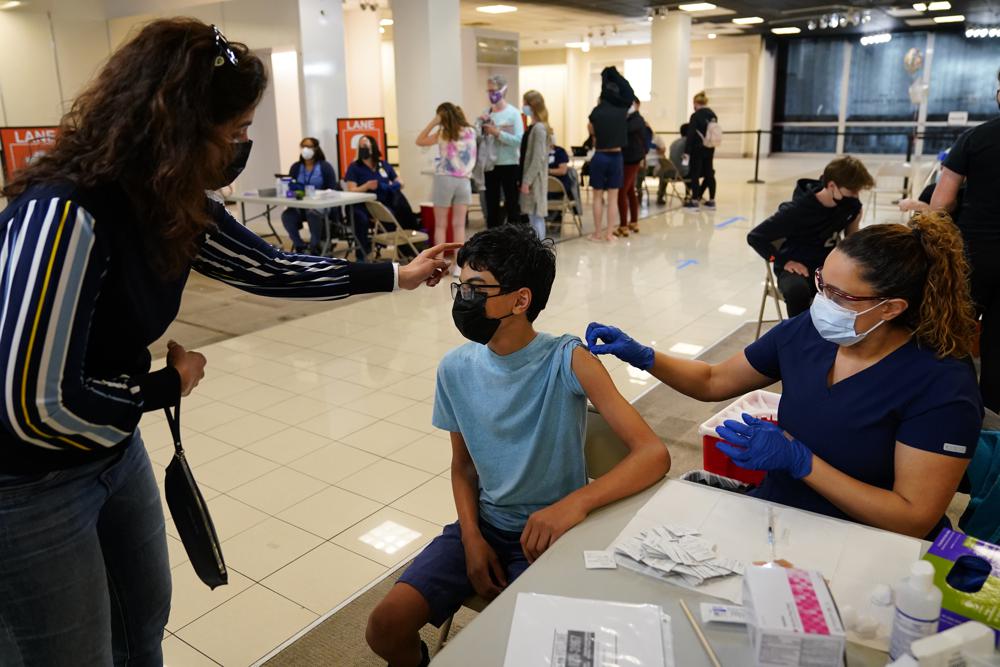
On Thursday, Governor Kay Ivey announced Alabama is expanding COVID-19 vaccination eligibility to include individuals age 12 and older, effective immediately. The U.S. Food and Drug Administration (FDA) authorized the Pfizer-BioNTech COVID-19 vaccine for emergency use in adolescents on Monday. The Center for Disease Control Director Rochelle Walensky stated, “The CDC now recommends the vaccine be used among this population, and providers may begin vaccinating them right away.” Ivey commented, “This is great and welcome news that the Pfizer-BioNTech vaccine will now be available for Alabamians 12 and up, offering another option for families in our state as we get back into full gear. We have seen good success so far with these safe and effective vaccines, and I encourage parents and children to consult with your pediatrician if you have any questions. The vaccine is our ticket back to normal, and I continue to feel optimistic and hopeful in the positive direction we are moving in as a state.” The Pfizer vaccine is available to individuals age 12 and up. The Moderna and Johnson & Johnson vaccines are available to individuals 18 years of age and older. On Twitter, Ivey stated, “Alabama is expanding #COVID19 vaccination eligibility to include individuals age 12 & older, effective immediately. This is great news! Folks, the vaccine is our ticket back to normal.” Alabama is expanding #COVID19 vaccination eligibility to include individuals age 12 & older, effective immediately. This is great news! Folks, the vaccine is our ticket back to normal. #alpolitics @ALPublicHealth https://t.co/tJenuuoqGn — Governor Kay Ivey (@GovernorKayIvey) May 13, 2021 “We encourage the vaccination of adolescents ages 12 and older to get the protection offered by the Pfizer COVID-19 vaccine,” State Health Officer Dr. Scott Harris stated. “This vaccine will be available at private providers and other sites which have Pfizer COVID-19 vaccine available.” As of May 12, 2,722,909 doses of COVID-19 vaccines have been administered.
COVID-19 hospitalizations up 20% in Alabama in 10 days
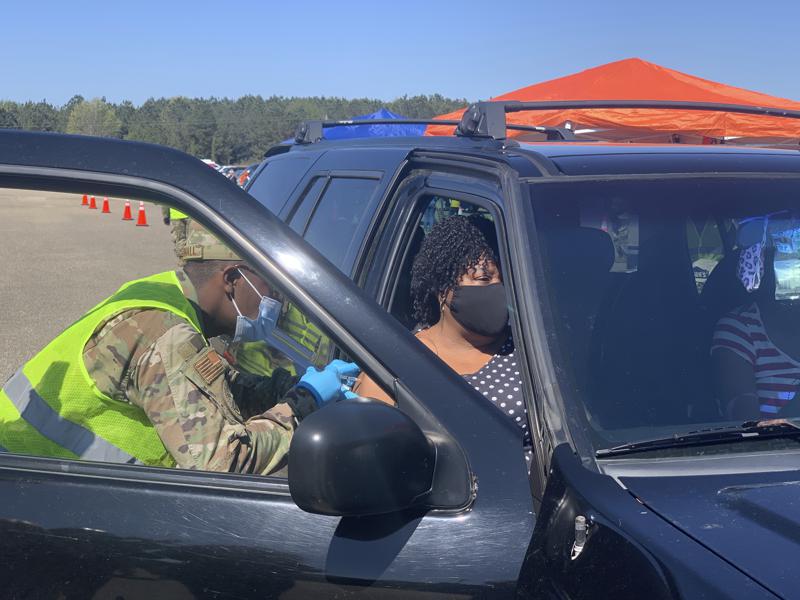
Hospitalizations linked to COVID-19 have jumped about 20% in less than two weeks in Alabama, a trend that health officials said Tuesday they were monitoring but didn’t consider it a sign of another coming crisis in the pandemic. Statistics from the Alabama Department of Public Health showed 362 people were hospitalized Monday for the illness caused by the new coronavirus. Though up from the 301 patients just 10 days earlier, the total was still just a fraction of the 3,070 patients who pushed the state’s intensive care wards to near capacity in mid-January. The increase in cases is concerning but doesn’t immediately threaten the state’s health care system because the number of people being treated remains far below levels from earlier this year, said Dr. Don Williamson, chief executive of the Alabama Hospital Association. Also, he said, a major spike in the number of severely ill patients isn’t expected because more and more people are being vaccinated, and increasing numbers of patients are young people, who tend to fare better than older patients with health complications. “It’s nothing dramatic, but it’s something we need to be aware is happening,” said Williamson, who previously served as state health officer. Over the past two weeks, the rolling average number of daily new cases has gone up by 163, an increase of about 50%, according to researchers at Johns Hopkins University. Dr. Scott Harris, who followed Williamson at Public Health, said officials were monitoring the increase in hospitalizations but aren’t yet sure of the cause. The bump follows spring break, Easter gatherings, and the end of the state’s mandatory face mask rule on April 9, any of which could be a factor. “The uptick in hospitalizations is just a reminder that our most vulnerable people still need to be cautious,” he told The Associated Press. More than 522,000 people have tested positive for COVID-19 in Alabama since the beginning of the pandemic, and nearly 10,800 have died. While about 1.4 million in the state have received at least one dose of vaccine, Alabama is last nationally in its rate of immunizing people. The vaccine is more plentiful than ever, Williamson said, but multiple hospitals statewide had immunization appointments available last week, “and no one was showing up to get the vaccines.” “In a significant number of our hospitals, the demand is down,” he said. It’s unclear whether the demand at hospitals was low because shots were available elsewhere or because large numbers of people are refusing to be vaccinated, Williamson said. Alabama Gov. Kay Ivey on Tuesday toured a community vaccination clinic at East Alabama Medical Center in Opelika. “It’s a whole lot easier to get a shot than being on a ventilator with COVID,” Ivey said when asked what she would say to people hesitant to get the vaccine. ____ AP writer Kim Chandler in Montgomery contributed to this report. Republished with the permission of the Associated Press.
Alabama pauses use of Johnson & Johnson vaccine
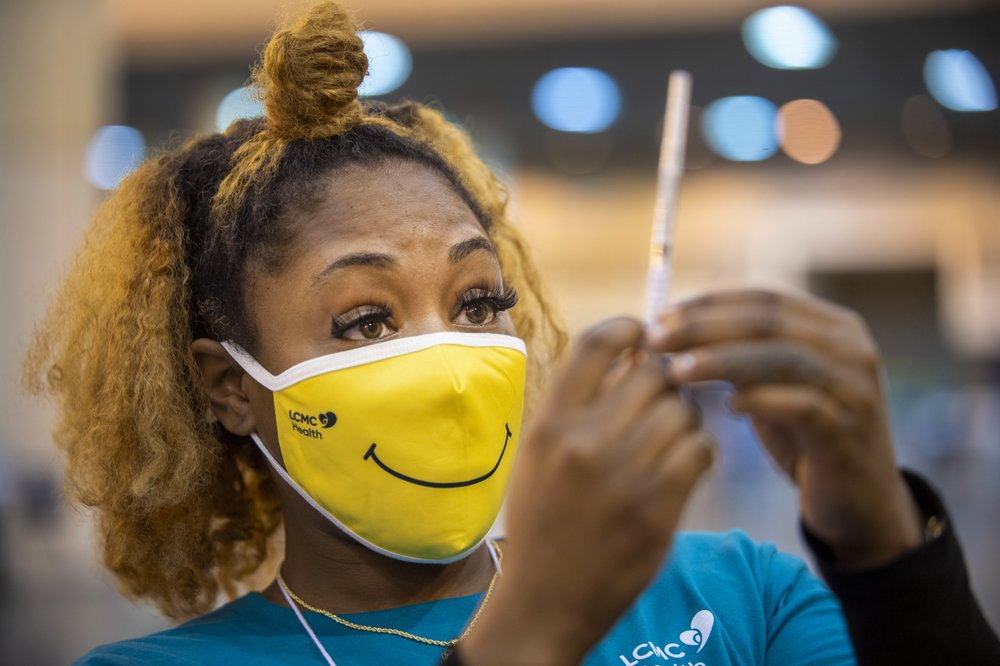
Alabama has temporarily paused giving the single-dose Johnson & Johnson COVID-19 vaccine out of an “abundance of caution” while federal officials investigate reports of rare blood clots, the state health officer announced Tuesday. The Centers for Disease Control and Prevention and the Food and Drug Administration announced Tuesday that they were investigating unusual clots that occurred in six women 6 to 13 days after vaccination. Dr. Scott Harris, Alabama’s state health officer, said Alabama will follow the recommendation to pause the use of the vaccine out of an “abundance of caution” while federal officials investigate if there is any connection between the clots and the vaccine. Harris cautioned people to remember these were six incidents out of 6.8 million doses of the J&J vaccine that have been given in the U.S. “COVID-19 vaccine safety is a top priority for Alabama. It is important to know that the adverse effects potentially stemming from the Johnson & Johnson shot have been extremely rare in the country, but out of an abundance of caution, Alabama is temporarily pausing these shots until we know more,” Alabama Gov. Kay Ivey said in a statement. The pause throws an unexpected wrench in states’ vaccination plans. Some vaccine appointments were likely canceled this week, Harris said. But he added that the J&J vaccine makes up a small portion of the shots given in Alabama, so it should not have a large effect on vaccine availability. Alabama has more than 300 providers distributing the J&J vaccine. “I don’t know how many of them had clinic scheduled today, but certainly a lot of them,” Harris said. Alabama has so far distributed about 71,000 J&J doses. Harris said the state has another 88,000 or so doses that will sit on shelves while the investigation is carried out. He said that the vaccine will be good until June. The Alabama National Guard halted plans to start giving the one-shot vaccine in clinics in addition to the two-shot doses. However, the vaccine had only accounted for 71,000 of the more than 2 million COVID vaccinations given in the state, so Harris said the pause will not have a large effect on distribution. However, Harris said they had hoped to use the one-shot vaccine for harder-to-reach populations, such as those who are homebound. The clots occurred in veins that drain blood from the brain and occurred together with low platelets, the fragments in blood that normally form clots. All six cases were in women between the ages of 18 and 48. One person died, and all of the cases remain under investigation.


